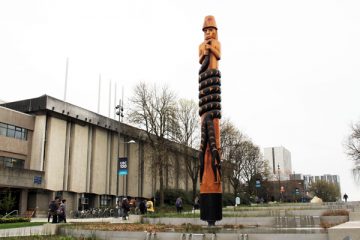With the support of the 2016-17 Teaching and Learning Enhancement Fund (TLEF) grant, the online resource Time and Place at UBC: Our Histories and Relations has been undergoing exciting new developments.
During the summer, Musqueam Archivist Jason Woolman worked with UBC NITEP student Sara Louie, who is also a Musqueam community member, to create a Musqueam timeline row. Their work on this additional and important row of historical information and Musqueam representation on the timeline is now entering the later stages of community consultations, documentations, and revisions. We are eagerly anticipating the public release of the Musqueam timeline row in the near future, and look forward to sharing a profile that will introduce Sara and her work.
In the meantime, we would like to introduce Mathew Andreatta, who has joined us this fall to work on developing an Educator’s Guide to support the use of the Musqueam timeline across diverse teaching and learning settings. Please join us in welcoming Mathew!
Learn more about the TLEF project.
I think a success here would be to deepen our understandings of Musqueam’s relationship to the land we’re on at UBC and to have people reflect on what it means to have those relations disrupted in the many ways it has been. This is also directly related to the land acknowledgements we hear so often at UBC. Through this work, I am hoping we can add some more depth and meaning to these acknowledgements as we hear them across campus. It seems to me they have become too easy for many, with the weight of the words “traditional, unceded, ancestral territory” not exactly resonating with many in the way they should. I think if we can make people stop and think a little bit about what it means to be here and reflect on those feelings, we’ve had success.
– Mathew Andreatta, fourth-year First Nations and Indigenous Studies (FNIS) student and Student Assistant on the Time and Place at UBC project

Musqueam sʔi:ɬqəy̓ qeqən (double-headed serpent post), Photo by: Sarah Ling
Tell us a little about yourself
My name is Mathew Andreatta. My ancestral roots are from the First Nations on Vancouver Island on my Grandfather’s side and Musqueam on my Grandmother’s side, as well as Italian ancestry on my father’s side of the family. I am in my final year here at UBC with a major in First Nations and Indigenous Studies (FNIS).
What drew you to this project?
I was drawn to this project by the potential to learn more about my relations with Musqueam and to strengthen them through important work like this timeline. I was also very impressed by and admiring of the dedication that Hanae Tsukada put into this project to educate people more thoroughly about our presence at UBC on the ancestral, unceded, traditional territory of the Musqueam people and the implications of this uninvited occupation on the part of the university.
What would you like to learn about or challenge yourself with in this project?
I am really interested in seeing the process of developing an Educator’s Guide and all the hard work that goes into such projects. I think that’s going to be a challenge itself. This process is new to me and navigating the many working pieces that go into it will be difficult. This is, however, another aspect that drew me to this work; I enjoy challenging myself and learning new ways to apply the many decolonial methodologies we learn through FNIS to projects like this. I am also looking forward to learning more about the relationship between UBC and Musqueam and how to deepen others’ understandings of the historic and ongoing dynamics at work within it.
What would success in this project look like?
This is a difficult question, but when I take on work like this I go in with the hopes that people can draw strength or knowledge in any way they can from it; everyone takes in and processes this sort of information differently. I think a success here would be to deepen our understandings of Musqueam’s relationship to the land we’re on at UBC and to have people reflect on what it means to have those relations disrupted in the many ways it has been. This is also directly related to the land acknowledgements we hear so often at UBC. Through this work, I am hoping we can add some more depth and meaning to these acknowledgements as we hear them across campus. It seems to me they have become too easy for many, with the weight of the words “traditional, unceded, ancestral territory” not exactly resonating with many in the way they should. I think if we can make people stop and think a little bit about what it means to be here and reflect on those feelings, we’ve had success.
